Four-day working week: Merthyr firm takes part in global trial
- Published
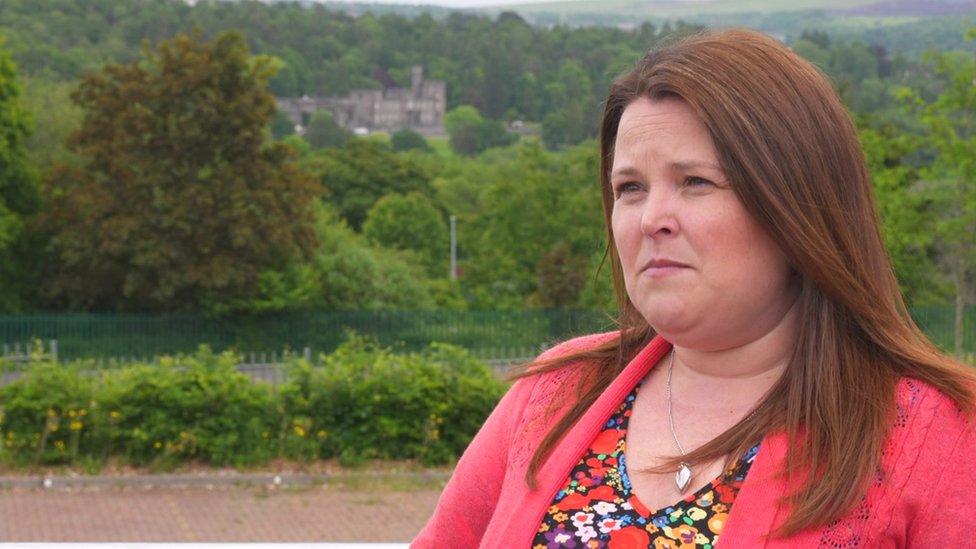
Ruth Llewellyn said she would decide on her day off depending on her workload from week to week
A firm in Merthyr Tydfil is part of the world's biggest four-day week trial.
Housing association Merthyr Valleys is one of 70 UK companies in the six-month trial which will see them work fewer hours for the same pay.
Employees say the trial could be "life-changing", but the company says tenants must not see a reduced service.
The aim is to gather data on how the system works in all sorts of businesses in order to encourage more employers to offer a shorter working week.
The whole 225-strong workforce, from carpenters to communications, from the chief executive to the call centre, started working fewer hours earlier this week.
Marcus Powell, chair of the democratic body which represents employees and residents of the housing association to the board, said he believed the opportunity was "life changing".
Although some workers wondered whether it was too good to be true, he said, there was "lots of excitement through the organisation".
"I think it's life changing, because on my day off I can spend more time with my family.
"I certainly don't want to be doing any housework, I'll still leave that to the weekend, but for me it's about spending more quality time with my friends and family and being able to relax on those days."
Not everyone has decided to have one less day in the office.
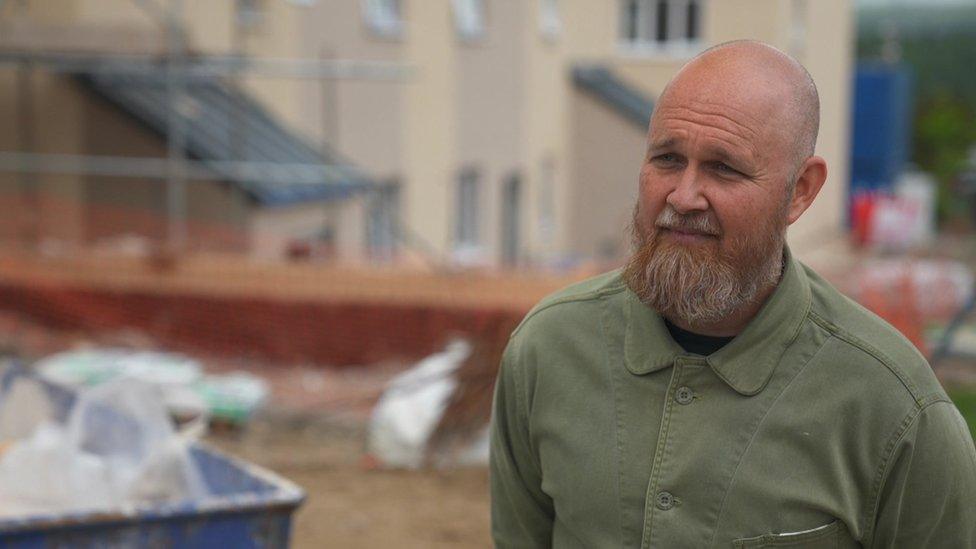
Gerald Charles has decided to do a five-day week during term time working 09:00 to 15:00 Monday to Friday
Gerald Charles manages the gas contracts for the organisation and has decided to do a five-day week during term time.
He will work 09:00 until 15:00 while his daughter is at school, then during the holidays he will work a four-day week.
"It's fantastic for my personal life, it means that I'm able to take on more responsibility at home and my wife, who isn't able to do what I'm able to do, she doesn't have to worry about any more, which is fantastic. I can't fault it," he said.
Ruth Llewellyn, head of human resources, has been organising the rollout of the project.
She said she intends to work flexibly and change her day off depending on how the week pans out.
She said she would fill her time with seeing friends and family and hopes to do more of the "general things that you struggle to fit into your working week, things like hairdressers appointments, sorting out your home insurance".
She said they were able to offer a four-day week by being more productive in the time that they were on site.
"I think the challenge from us to our colleagues, is to ask yourselves 'why?' If you're doing something, why am I doing it? Why am I doing it this way? Is there a better way? Is there a quicker way?
"Just getting us all to focus on the time we have at work."
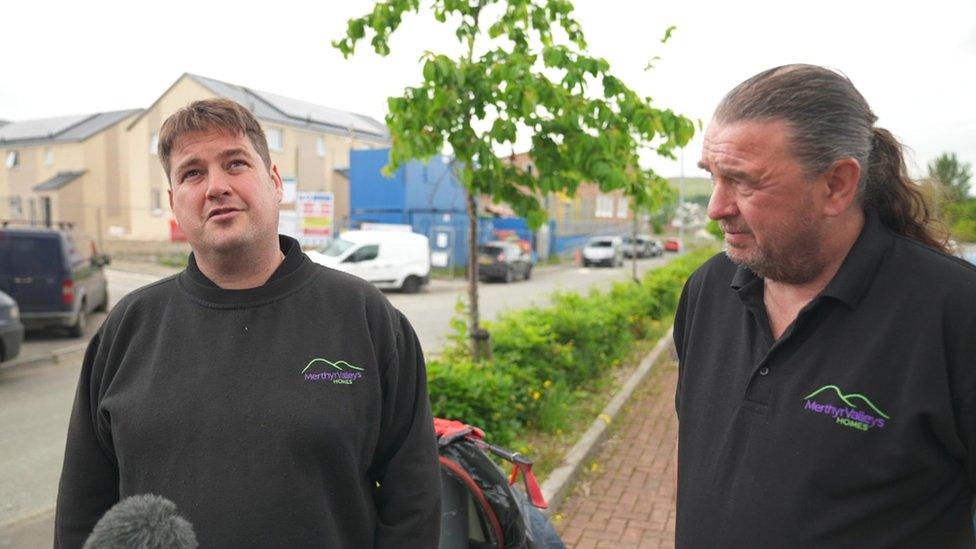
Dai and Gary will measure their productivity in tonnes collected
David McLoughlin and Gary Flye are a two-person team who work for the environmental department and deal with fly-tipping across the borough. They have decided to have a Friday off.
Usually they would cover the whole borough, which is 12 miles (19km) across, by going from place to place.
They will now spend more time in one place, maybe one part of the borough in the morning and another in the afternoon. They will measure their productivity in tonnes collected.
"We're trying to work a little bit smarter, a little bit harder Monday to Thursday, so we can get the nice Friday benefit," said Dai.
He is looking forward to taking his kids to school on his day off and having some time to relax and catch up on housework and DIY jobs.
For Gary, it is his partner that will feel the benefit.
"With me, I play a lot of sport on the weekend so my partner doesn't see me much on the weekend. She doesn't work on a Friday, so this it'll give me a chance to take her out.
"Whether that's a good thing, I don't know, but it'll keep her happy."
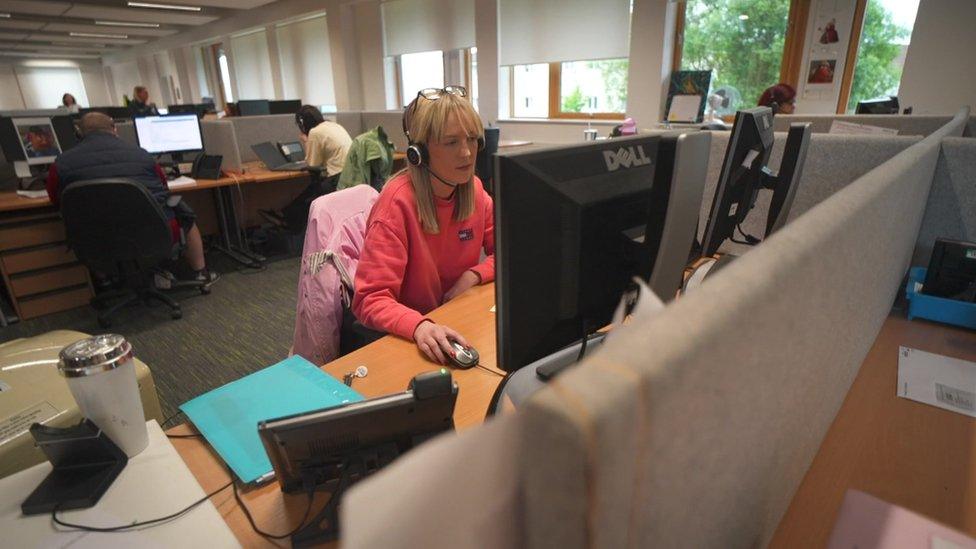
Everyone at the housing association is working a four-day week or the equivalent number of hours
"I've got grand plans - whether they come off is another thing," said Allison Soroko, from the communications team.
At the moment, she said, her weekends were "really busy".
"I work Monday to Friday and I've got two kids, a husband and a dog, so the weekends are spent cooking, cleaning, shipping the kids around, so Saturdays and Sundays are really busy.
"So I'm really looking forward to having some time off just to pick up those tasks and to pinch a little bit of time for me."
It's clear all the employees I spoke to that they want the trial to work, but there is a risk productivity does not improve, according to Gerald Charles.
"From my point of view, it's all down to Key Performance Indicators (KPIs)," said Mr Charles.
"I monitor what's being done daily and then what the results are at the end of the week, which tells me how things are going, so as long as we can keep up with our KPIs and we can maintain the 100% then yes, of course it will work.
"I want it to work, my wife wants it to work and everyone in the company wants it to work, so it's definitely got the full support, so why not?"
Surveys have been carried out before the trial to measure productivity in all of the company's departments. They'll be monitored throughout the six months and compared at the end to measure the success of the trial.
Ruth Llewellyn said: "Our main aim is to demonstrate that there's absolutely no impact on our services. Our main measure is going to be on tenants and colleagues.
"For our colleagues, how are they feeling that it's working for them? How are they using that extra day? Is it bringing the additional wellbeing benefits that we expect it to bring? And for our tenants, are we still delivering the service that they expect? Do we need to do things differently?"
Surveys will be completed by employees and tenants throughout the trial to see what their experiences are.
All the workers we spoke to mentioned the impact of the pandemic on the way they thought and felt about their work.
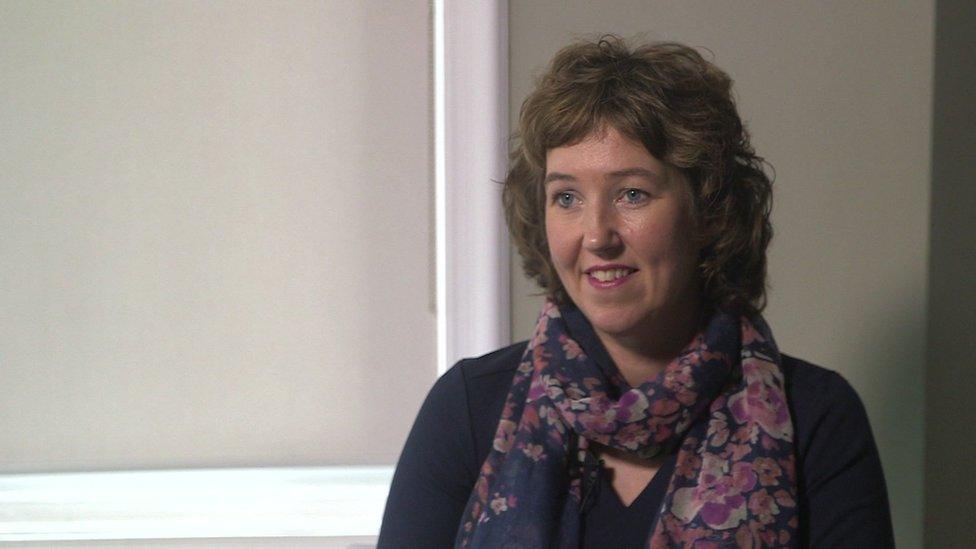
Employment lawyer Fflur Jones said that before the pandemic "we didn't know things could be done slightly differently"
Fflur Jones, is an employment lawyer with Darwin Gray in Cardiff.
She said that before the pandemic, "we didn't know things could be done slightly differently".
"This is a great time for this to be experimented upon because there is so much dissatisfaction with the status quo."
She said the desire for more work-life balance was a "phenomenon" after the pandemic, and it is here to stay.
"It's more about the flexibility and the hours of work and the location of work now than it is about salaries, for sure.
"That comes up time and time again when people look to move. It's a proper phenomenon. And I don't think it's going to go away, particularly while there are so many roles out there, so it is the employee's market rather than the employer's being able to pick and choose who to take or to retain."
The pilot is being organised by 4 Day Week Global in partnership with think tank Autonomy, the 4 Day Week UK Campaign, and researchers at Cambridge University, Oxford University and Boston College.

Will Stronge said many kinds of work and the working day is "elastic" as productivity can wane due to tiredness
But can the four-day working week work for all workplaces? It can work for many according to Will Stronge from employment think tank, Autonomy, but not all.
"If you look at things like health care, teaching, social care, these are the kinds of work which actually, if you reduce their working week, they wouldn't necessarily become more productive," said Mr Stronge.
"That kind of work is not amenable to simply reducing the working week, you need to increase the staff count or the headcount.
"In many companies though, that's just not the case and in many kinds of work the working day is what we call elastic. So a lot can get done in a short amount of time and then in another period of the day, if staff are burnt out or tired or things just don't go their way. there can be less productive hours of the day.
"It's one of the myths about productivity, that greater productivity is achieved when you work longer hours. On a very macro economic level, that's just not the case."
He added that Greece and Mexico work longer hours but their economy did not perform better, while other countries such as Netherlands, Germany, France and many others worked fewer hours than in the UK but were more productive in general.
"What's really exciting about that is that researchers, such as us at Autonomy and academic researchers at Cambridge and Boston, are going to really get their hands on new data for a whole range of organisations and you can evaluate what works and what doesn't work and hopefully inform policy rollout more broadly following the trial," he added.

BORN DEAF, RAISED HEARING: Jonny Cotsen explores what it means to live in two different worlds
CAREER CHANGE WITH A DIFFERENCE: Police new recruits adapt to life on the beat

- Published6 June 2022
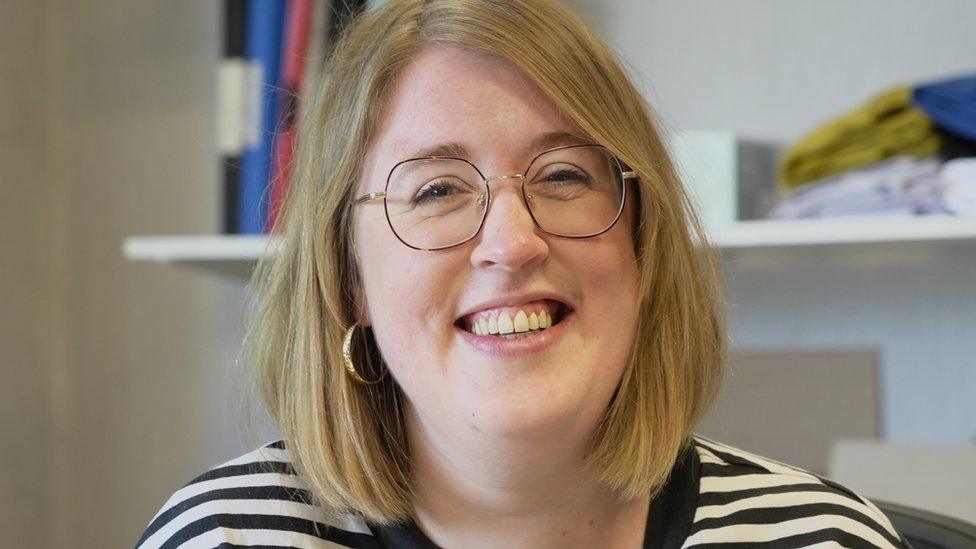
- Published11 February 2022
